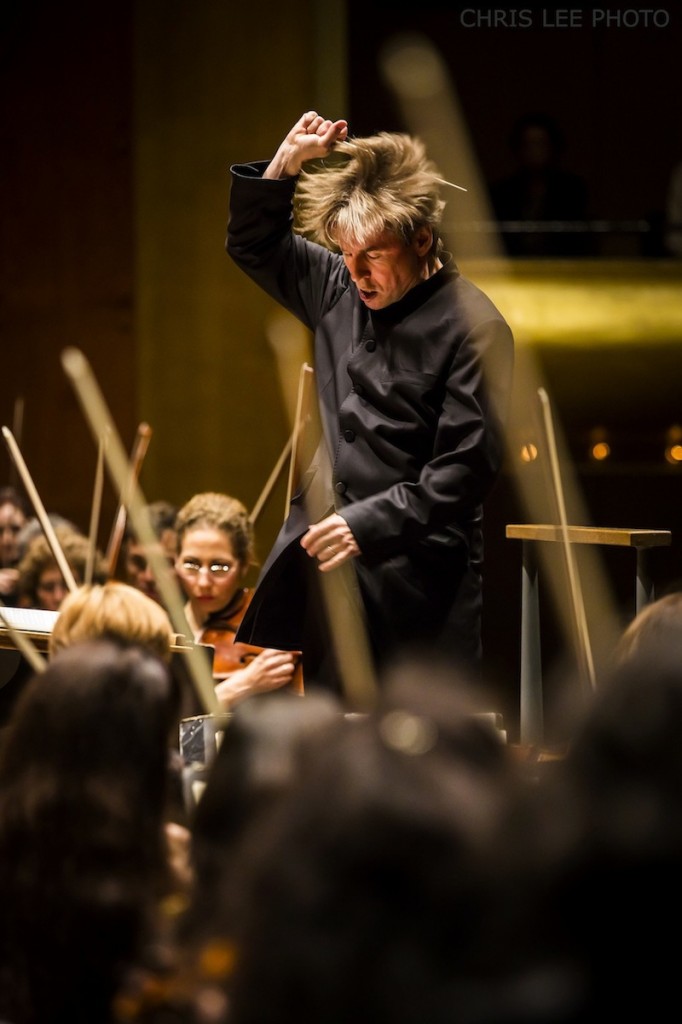Salonen, Philharmonic strike sparks in a spectacular “Firebird”

Esa-Pekka Salonen led the New York Philharmonic in music of Beethoven and Stravinsky Thursday night. Photo: Chris Lee
The centuries have given us formidable examples of composer-conductors (witness Gustav Mahler and Richard Strauss), yet these days it seems composers seldom appear on the podium except to lead their own works. Esa-Pekka Salonen is a rare breed, one who wears both hats equally well.
On paper, it seemed odd for a composer of Salonen’s stature to guest conduct a concert with no contemporary music. His program with the New York Philharmonic on Thursday may have been conventional, but he led it with such skill, intelligence, and, ultimately, passion, that its rewards were manifest.
Thursday night’s program opened with Beethoven’s King Stephen Overture. Salonen’s conducting was businesslike, yet nonetheless effective. The Finnish maestro sculpted a well-considered interpretation, and drew a bright, self-assured sound out of the Philharmonic.
Jeremy Denk was the evening’s soloist in an assertive yet nuanced account of Beethoven’s Piano Concerto No. 1. His first entrance after the orchestral exposition was modest, with a faint glow in his sound. It was a ruse, and a convincing one. Denk cheekily unfolded those lyrical opening strains and tied them directly into virtuosic, energetic runs that followed. He mostly kept a steady pace, but did not let that restrain a constant feeling of impetuosity.
Denk showed tremendous freedom in the Largo, not letting the piece’s Classical roots keep him from approaching the music with Romantic passion—you almost thought you were listening to Brahms. He played the closing Rondo with a lively, hopping energy that was matched by Salonen, who had hitherto continued his no-nonsense approach. The last movement’s cadenza (by Beethoven), though brief, was evocative, and Denk delivered his closing statement with a superb touch of wit. It’s not every day that early works by Beethoven receive such an ecstatic response as was received Thursday from the Avery Fisher crowd.
An ecstatic response is expected, though, for Stravinsky’s Firebird, and Thursday’s tremendous ovation was absolutely earned. The Philharmonic can be inconsistent, but performances like this remind one that when these musicians are at their best, they are on a level with just about any orchestra in the world.
Moreover, interpretations like Salonen’s remind us that The Firebird, far more than just a matinee favorite, deserves its reputation as one of the great post-Romantic masterpieces. Beginning to end, this performance was electric, finding Salonen in a completely different, relentlessly energetic temperament than he had shown in the first half.
The highlights were many: The horn solo marking Prince Ivan’s appearance emerged gorgeous and gauzy. The Infernal Dance was explosive and startling, fueled by burning fury. The woodwind solos in the Berceuse were breathtaking, doleful and seductive at once, and the music moved from there through a glistening transition into the final scene, broad and rapturous.
But this was not a moment-by-moment, sightseeing approach to the piece. Salonen kept the ballet’s narrative arc always in mind, giving each sequence its due place in the whole, and maximizing the music’s dramatic effect, even without the benefit of the visual element.
For the Philharmonic, they have rarely sounded better in recent years. Their dynamic range was awe-inspiring: they reached whispered pianissimos, shattering, enveloping fortissimos, and everything in between. But beyond just sheer firepower, the orchestra’s balance was impeccable, always seeming to give Salonen precisely what he wanted, creating rich, evocative textures and capitalizing on the intricate layering of the score.
Solos from the violins, horns, and woodwinds were delivered with yearning sentiment, and the orchestra’s colors, both in their range and in their split-second variation, were spectacular, generating what seemed like a constant clash between fire and ice. Ensemble throughout the piece was almost unassailable, but never felt regimented—the Philharmonic achieved open, generous playing in complete unison.
The magic of the score, both its mystical fascination and its searing, heart-swelling passion, was fully realized. One could hardly ask for a more powerful Firebird than was heard Thursday—not even that of the Berlin Philharmonic two weeks ago.
The program will be repeated 8 p.m. Friday and Saturday. nyphil.org



Posted Oct 17, 2014 at 11:50 pm by M.F. Marr
The NYC audience paid a rare compliment to Esa-Pekka Salonen and the NY Philharmonic tonight (Friday): they didn’t stampede down the aisles to catch a train or cab at the conclusion, as is customary, regardless of the program or its performance quality. They paid their respects on their feet with applause and shouts for a very long time. I believe all recognized that they just experienced something extraordinary.
Salonen and the NY Philharmonic orchestra are brilliantly matched.
A shout out as well for the brilliant performance by pianist Jeremy Denk in the Beethoven First Piano Concerto, sensitively conducted by Salonen and played by the orchestra.
Anyone reading this review that can make it to Lincoln Center to see this tomorrow night/Saturday will experience a memorable performance.